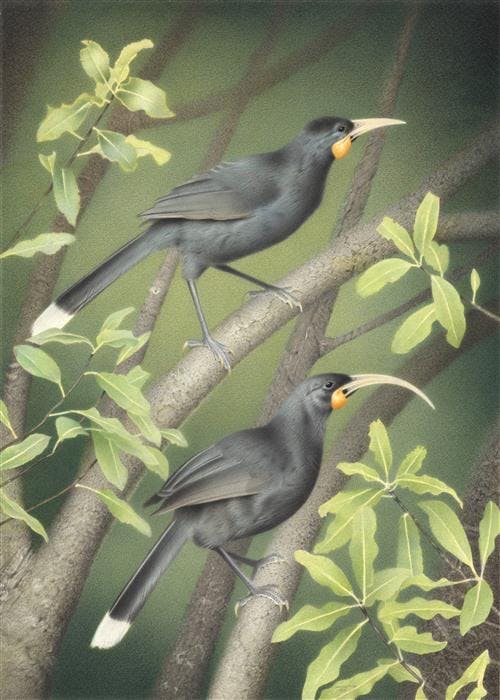
Paul Martinson, Huia.
Photo Credit

Paul Martinson, Huia.
Photo Credit
Recorded as one of the first birds to begin the extraordinary dawn chorus of Aotearoa - Huia are undeniably one of New Zealand's most iconic and cherished song birds. Sacred to Māori, beloved by European settlers, they became extinct in the 1920s as a result of the overwhelming impact of introduced predators.
Huia were once found throughout the North Island from North Cape to Wellington but extensive hunting by Māori and the subsequent introduction of pacific rats saw the birds population contract almost entirely to the Tararua and Ruahine ranges. Then a wave of European immigration to Aotearoa in the 18th century brought cats and ship rats. This set in stone the pathway for the Huia’s ultimate demise
Huia are a unique sexually dimorphic species. The female has a longer more decurved bill than the male but both sexes share the same chalky green black plumage with fleshy orange wattles. The birds are known to have preferred open habitat rather than the dense forest terrain they inhabited in an attempt to shelter as their population dwindled. They had a varied diet of insects such as butterflies, moths, weta and spiders, as well as a variety of vegetation including the berries of coprosma, hinau and kahikatea.
Paul Martinson’s exhibition Huia tells the story of this taonga (treasure) through the eyes of science and an artistic imagination. Martinson’s faithful representations of Huia are made in reference to rare museum skins and acknowledges the tragic loss to Aotearoa’s dawn chorus. This series of artworks tells the story of the Huia from the perspective of a surrealist mind; reconstructing how this lost species would have appeared, with scientific accuracy and stunning artistic detail.
Recorded as one of the first birds to begin the extraordinary dawn chorus of Aotearoa - Huia are undeniably one of New Zealand's most iconic and cherished song birds. Sacred to Māori, beloved by European settlers, they became extinct in the 1920s as a result of the overwhelming impact of introduced predators.
Huia were once found throughout the North Island from North Cape to Wellington but extensive hunting by Māori and the subsequent introduction of pacific rats saw the birds population contract almost entirely to the Tararua and Ruahine ranges. Then a wave of European immigration to Aotearoa in the 18th century brought cats and ship rats. This set in stone the pathway for the Huia’s ultimate demise
Huia are a unique sexually dimorphic species. The female has a longer more decurved bill than the male but both sexes share the same chalky green black plumage with fleshy orange wattles. The birds are known to have preferred open habitat rather than the dense forest terrain they inhabited in an attempt to shelter as their population dwindled. They had a varied diet of insects such as butterflies, moths, weta and spiders, as well as a variety of vegetation including the berries of coprosma, hinau and kahikatea.
Paul Martinson’s exhibition Huia tells the story of this taonga (treasure) through the eyes of science and an artistic imagination. Martinson’s faithful representations of Huia are made in reference to rare museum skins and acknowledges the tragic loss to Aotearoa’s dawn chorus. This series of artworks tells the story of the Huia from the perspective of a surrealist mind; reconstructing how this lost species would have appeared, with scientific accuracy and stunning artistic detail.